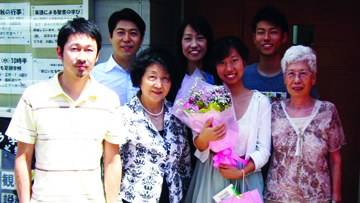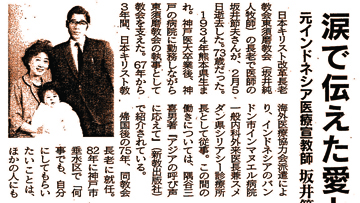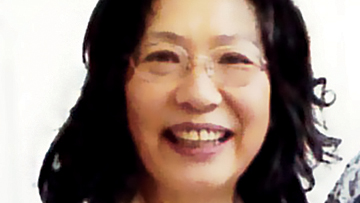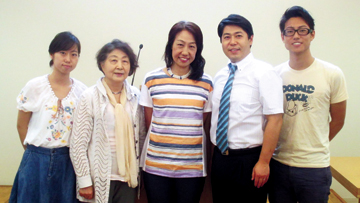You have free articles remaining this month.
Subscribe to the RP Witness for full access to new articles and the complete archives.
This is the testimony of Tomoko Sakai, a member of Higashisuma RPC in Kobe, Japan, as related by Kumiko Kudo, a member of Kitasuzurandai Mission Church in Kobe. Both ladies were led to consider the claims of the gospel by RP missionaries: Mrs. Sakai through her contact with Orlena Lynn in the 1960s, and Mrs. Kudo through a Bible study with Bill and Kalli Sterrett in the 1980s.
This testimony is #11 in a series entitled Koinonia based on Kumiko Kudo’s interviews with RP Church members in Japan. Mrs. Kudo has taken on this project as a way of encouraging the believers in Japan. She has also published a novel entitled Dorokam (Mud Turtle), based on the true story of a Japanese gang member’s conversion in the early 1900s.
The English translation of Mrs. Sakai’s testimony is the result of a collaborative effort between the author and Susan Leach.
“But the word is very near you, in your mouth and in your heart, that you may observe it” (Deut. 30:14).
During my interview with Tomoko-san, she often reiterated this thought: “A Christian’s life story is not simply a documentary. It is a testimony of God with us, walking beside us in all of our trials. I can clearly see how God has carried me through my life by His providence. We do not receive His mercy in vain.”
For more than 50 years of walking by faith, this has been Tomoko’s deep conviction. She is confident of another thing as well—namely, that God in amazing ways spreads His good news around the globe like a net, using the small evangelistic efforts of each individual.
“When driven out of China, missionary Sam Boyle and his family came to Japan to begin an evangelistic work. At that time, Miss Orlena Lynn, who had decided to return to America, had a sudden change of heart. Instead, she gave her own money for the purchase of land, for the establishment of the evangelistic work of the Covenanter Bookstore. God was using her, though I knew nothing about it at the time, in beginning a mission work in Japan.”
Then, according to His plan, God laid hold of Tomoko’s life. While Tomoko was a student of English literature at Kobe Women’s College and looking for part-time work, someone introduced her to the Covenanter Bookstore, which was looking for a helper who could speak English.
The bookstore was not just a shop that sold Christian books. Every Sunday evening, by the rearranging of some bookshelves and chairs, it was transformed into a place of worship. While employed at the bookstore, Tomoko began to attend the evening worship services. The manager, Miss Lynn, also led a Bible study for young people, and Tomoko began to show up at the Bible studies now and then. Although she was learning from the Bible, Tomoko could not understand how a person could have a relationship with a God one cannot see.
Time passed. Then one day something happened. Miss Lynn quoted from John 11:25: “Jesus said to her, ‘I am the resurrection and the life; he who believes in Me will live, even if he dies.’” After reading this, Lynn-sensei looked Tomoko straight in the eye and said, ”Do you believe in this Jesus? If you believe, your name will be written in heaven.” She said it simply, directly, and boldly as if demanding a response. Tomoko repented of her previous attitude of thinking that she could pick and choose the doctrines that pleased her. From this turning point in her life, she began to attend the Sunday worship services at the Ichinotani Kyokai every week so she could diligently learn from the Bible. At long last she came to profess her faith.
Tomoko told me, “God anointed me with oil. He placed the seal of His covenant upon me and gave me His Holy Spirit as a guarantee for my heart. By the work of the Holy Spirit, I began to understand how a person can have a relationship with God. Growing conviction of the truth of God’s Word was the clear evidence of the work of God’s Spirit.
“There was another reason for thanks. Every Sunday at the Reformed Presbyterian Church there were sermons based in the Reformed faith and backed by theological scholarship. Having been educated in the principles of the faith by the sermons of such teachers supported my faith later when I was in Indonesia.”
Also, Tomoko referred to the preaching of Pastor Sam Boyle. Though in imperfect Japanese, it was powerful and like the “growling of a lion.”
The focus of our conversation then changed to the subject of marriage. “It was not such an amazing love story,” explained Tomoko in a serious tone, “but both [my future husband and I] desired to be married to a Christian.” A missionary had introduced her to a young man, Mr. Setsuo Sakai. I can easily imagine that Mr. Sakai would have been quietly attracted to Tomoko, with her deep faith and godliness. As for Mr. Sakai, he outwardly seemed to be a reserved and cool Kyuushuu man, but inwardly his personality was very alive. “My husband was very serious, but sometimes he would say things that were quite funny. He made me laugh. But now, I miss that.” In these words, Mrs. Sakai expressed her quiet love for her husband.
As a young married woman living by faith, Tomoko became involved in the routines of daily life. Around that time (1966), an unexpected request came to the couple from the board of directors of the Japan Christian Medical Society (JOCS). Because Mr. Sakai was a doctor, he was asked to consider applying for a position at Emmanuel Hospital in Bandung, Indonesia. After praying about this matter, Dr. Sakai sent a letter declaring his decision, which read as follows:
“Go forth from your country and from your relatives and from your father’s house to the land which I will show you” (Gen. 12:1). At this time it is my pleasure to testify that I aspire to take on the work as Dr. Umeyama’s successor, to the honor of God’s name. I have had a vision for work in Indonesia for several years. As I prayed, God has led me to study the Indonesian language and now to work as a dermatologist. All this, I believe, was God’s plan. God has used missionaries from Western nations to spread the Christian faith abroad. Therefore, is it not our responsibility to bring Christianity to the souls of people in Southeast Asia? Even though we are inadequate for the task, we want to be used for this work. As a couple we are not physically strong, and as a doctor I am not very experienced, but I will confidently accept the position in reliance upon God’s word, as stated in 2 Timothy: “Be strong in the grace that is in Christ Jesus” (2:1).
Soon afterwards, Tomoko became uneasy and thought to herself, “I hope his unreasonable ideas will go away.” But her husband’s determination was strong, and, as he prayed earnestly, the plans progressed faster and faster. At last, Tomoko could not avoid following Jesus, who is the true Good Samaritan.
When they departed for Indonesia, Dr. Sakai spoke in his testimony about Simon of Cyrene bearing the cross of Christ. But as might have been expected, Tomoko was stricken with fears. “Why does God send us, such young and inexperienced people?” she wondered. But she entrusted everything to the Lord, and He gave her peace in her heart. Encouraged by the prayers of people in her church as well as Christians outside their church, and taking along their nine-month-old son (now Pastor Sumito Sakai of Higashisuma RPC), the couple finally set out for Indonesia, “the land of everlasting summer.”
When the Sakais arrived at the Jakarta airport in the sweltering heat, dark-skinned people, adults and children, rushed to them with pleading and outstretched arms. “This scene revealed in microcosm something happening all over Asia—people living in poverty and desperation as if gasping for air. Even today, we who live in developed nations cannot imagine it. Those of us who live in Japan and in the West must not forget the shadow that looms over those in great poverty—such as these poor brothers in Indonesia.”
Mrs. Sakai wrote these words of testimony for the celebration of the 20th anniversary of Higashisuma RPC: “Even after achieving independence, Indonesia experienced hardship and the lingering effects of colonialism. In the church as well there was plenty of evidence of disruption. In Java, the very heart of the nation, huge populations were suffering from poverty, disease, and social problems. The memory of the attempted coup against Sukarno [Indonesia’s first president] the previous year (1965) was still fresh in the minds of the people. As we surveyed the green hills of Java’s countryside, we wondered why this rich land could not support its people. During our three years in that land, we experienced good times as well as hard times. It was a long time before I could comprehend the kinds of historical factors that had brought about such conditions.”
Dr. Sakai was sent to work in the outlying country at Emmanuel Hospital, which had been established during the Dutch colonial period. It was across the mountains and 200 kilometers from Jakarta. Many international doctors were working as interns at the facility with its spacious grounds. The Sakai family shared lodging and meals with several other families. They worshiped together, and they shared in life’s joys and hardships together. Such was their day-to-day experience.
Tomoko remembers little Sumito, not yet four, watching the cows grazing as he stood under a huge bougainvillea—a tree so large that it would take many people with hands joined to encircle it. She remembers Sumito running and playing energetically with the other children from the lodging house, all of them calling out in their various native languages.
Health conditions in Indonesia were very poor. People’s lives were threatened by dysentery, cholera, and smallpox. The Sakais prayed to the Lord, and He answered and brought healing. More than in her previous life in her homeland, Tomoko experienced closeness to God as she read the Bible. In reading Psalm 139, she felt as though she were meeting the Lord anew. “Learning to identify with people of another culture and to understand them was both amazing and wonderful,” wrote Tomoko in the story she contributed to Higashisuma’s anniversary publication.
Although 90 percent of Indonesia’s population is Muslim, a small Christian population had begun to grow when Indonesia was a Dutch colony. “The Dutch colonial period was not entirely a good thing,” Tomoko stated. “But ultimately, God used the miserable state of affairs of that time to extend His good news.”
She continued, “Besides conducting health examinations in general medicine and dermatology at Emmanuel, my husband also went back and forth a few times a week to the Sumedan Clinic, which had been built by the Japan Medical Mission. The Lord granted good international communication by means of medical care.”
Tomoko’s work involved visiting patients in the hospital wards and managing the school supplies for the hospital’s kindergarten. She sometimes cut bamboo for ikebana (flower arranging) and thus shared part of her own culture as a means of fellowship. No doubt everyone responded to her arrangements with oohs and ahhs.
During our conversation, Tomoko was moved to share two stories about Christians she met in Indonesia. The first regarded the chaplain of Emmanuel Hospital, a man named Aba Yakin Elia Maranata. His name meant, “With consuming zeal, like Elijah, I wait for the second coming of the Lord.” Tomoko was impressed that his parents chose this name for their son. Even more, she was impressed to see how the Christian faith was alive in that Muslim land where a man possessing this name served as chaplain of a Christian hospital.
The second story regarded Mr. Shurega, the director of the hospital. This man was descended from the Batak tribe, whose people had at one time been headhunters. Tomoko was amazed that God was not only working in Kobe, but in the Batak tribe, which she had never heard of before. Here too, God was working out His plan to communicate the good news, as Paul writes, “Preach the word. Be ready in season and out of season” (2 Tim. 4:2). According to God’s Word, ordinary people had preached the gospel, and, by God’s providence, the message of the gospel had spread and advanced. In this way, God was raising up laborers such as Mr. Shurega.
After returning to Japan, Tomoko’s husband spent 10 years working in public medical practice. Since it was Dr. Sakai’s desire to serve according to his faith, he then opened his own clinic in Tarumi Ward. Besides providing medical care for the community, the Sakais offered their facilities for the outreach work of the Hontamon Dendosho (Evangelism Center). On Sunday evenings, the Sakais opened their living room for evening worship and good fellowship. God drew many people there, including people who would later be baptized.
“However you want others to treat you, so treat them” (Matt. 7:12) was the verse Dr. and Mrs. Sakai raised like a banner and followed, as they pressed on with their work. Then, five years ago, after he had completed his mission, Dr. Sakai was called to heaven.
Tomoko said, “We wanted each of our three sons to choose his own path in life. Though we did not apply any pressure at all, Hontamon Dendosho merged with the Higashisuma Church, and afterwards our eldest son was installed as pastor. From here on we must work ever more diligently in evangelism. In God’s providence, the good news is being spread out like a net.
“Now it is the age of the ‘all powerful’ internet, so I think we must consider various new ways we can evangelize. But the foundation that connects us to the life of Christ consists of these three things: the Word, prayer, and the sacraments. Can a church that keeps these means of grace and faithfully puts them into practice fail to grow? People are given this power by God’s Word. So let’s keep working hard in the fellowship of the Holy Spirit, instructing each other in His Word, for the sake of the gospel—not only in our own denomination, but also with other fellow Christians who believe the true gospel. Each of us should remember this verse as our great motivation for evangelism: ‘For he says, “at the acceptable time I listened to you, and on the day of salvation I helped you.” Behold, now is “the acceptable time,” behold, now is “the day of salvation”’ (2 Cor. 6:2).”
Together with her husband, Tomoko has faithfully studied the Word, practiced it, guided in family worship, kept the Lord’s Day, and participated in the life of the church. This is Tomoko’s message.
I was privileged to meet with Tomoko, who often says, “I want to be this kind of person for the glory of God.” Clearly, the work of God upholds her.




